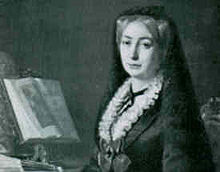Charlotte Guest
| Lady Charlotte Guest | |
|---|---|

Portrait of Lady Charlotte Guest
|
|
| Born |
Charlotte Elizabeth Bertie 19 May 1812 Uffington, Lincolnshire, England |
| Died | 15 January 1895 (age 82) Canford Manor, Dorset |
| Occupation | Translator, businesswoman |
| Spouse(s) |
John Josiah Guest, 1st Baronet (m. 1817–52) Charles Schreiber (m. 1855–84) |
| Children | Charlotte Maria Guest Ivor Bertie Guest Katharine Gwladys Guest Thomas Merthyr Guest Montague Guest Augustus Frederick Guest Arthur Edward Guest Mary Enid Evelyn Guest Constance Rhiannon Guest Blanche Guest |
| Parent(s) |
Albemarle Bertie, 9th Earl of Lindsey Charlotte Susannah Elizabeth Layard |
Lady Charlotte Elizabeth Guest (née Bertie; 19 May 1812 – 15 January 1895), later Lady Charlotte Schreiber, was an English aristocrat who is best known as the first publisher in modern print format of The Mabinogion which is the earliest prose literature of Britain. Guest established The Mabinogion as a source literature of Europe, claiming this recognition among literati in the context of contemporary passions for the Chivalric romance of King Arthur and the Gothic movement. The title Guest used derived from a mediaeval copyist error already established in the 18th century by William Owen Pughe and the London Welsh societies.
As an accomplished linguist, and the wife of a foremost Welsh ironmaster John Josiah Guest she became a leading figure in the study of literature and the wider Welsh Renaissance of the 19th century. With her second husband, as Charles Schreiber, she became a well known Victorian collector of porcelain; their collection is held in the Victoria and Albert Museum. She was also an international industrialist, pioneering liberal educator, philanthropist and elite society hostess.
Lady Charlotte was born on 19 May 1812 at Uffington House in Uffington, Lincolnshire, the daughter of Albemarle Bertie, 9th Earl of Lindsey (1744–1818), and his second wife Charlotte Susanna Elizabeth Layard. She was christened Lady Charlotte Elizabeth Bertie. When she was six years old she suffered the loss of her father and during this year she was also caught in a house fire, from which she escaped. Her mother later remarried the Reverend Peter Pegus, whom Charlotte disliked. She had two younger brothers and half-sisters. With time her mother slowly began to change from being an active women to someone who retreated with illness. It is during this time that Charlotte began to take over for her mother in the running of the house.
It appears that she particularly enjoyed the refuge of the garden and with time she developed a dislike for being kept inside. Furthermore, at the age of nineteen she had to continually apologize for her families actions. Ever since she was young she had a keen interest in politics and keenly expressed her views on topics that she has formed an opinion in. Charlotte showed a great aptitude for languages and literature. She taught herself Arabic, Hebrew, and Persian as well as studying Latin, Greek, French and Italian with her brothers' tutor. From looking at Lady Charlotte’s life it is clear that her life is very structured as she was someone who rose early and apparently despised laziness.
...
Wikipedia
